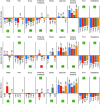Dietary changes during the Great Recession in Portugal: comparing the 2005/2006 and the 2014 health surveys
- PMID: 30898181
- PMCID: PMC10260471
- DOI: 10.1017/S136898001800410X
Dietary changes during the Great Recession in Portugal: comparing the 2005/2006 and the 2014 health surveys
Abstract
Objective: We aimed at analysing changes in consumption of selected food groups in the Portuguese population before and after the Great Recession, which hit the country between 2008 and 2013.
Design: We used pooled cross-sectional data from the Portuguese National Health Interview Surveys of 2005/2006 and 2014. We modelled the probability of consumption of soup, fish, meat, potatoes/rice/pasta, bread, legumes, fruit, vegetables and sweets/desserts, as a function of the year, controlling for age, sex and education, using logistic regressions. Then, we stratified the analysis by age group and education level. Analyses were adjusted for survey weights.
Setting: Portugal (2005/2006 to 2014).ParticipantsAdults (n 43273) aged 25-79 years.
Results: From 2005/2006 to 2014, there was a significantly lower consumption of fish, soup, fruit and vegetables. Conversely, the consumption of legumes and sweets/desserts was significantly higher in 2014. The changes in the selected food groups were consistent across most education levels. Among people aged 65 years or above, there were no significant changes in most foods, except an increase in the consumption of legumes and sweets/desserts. In contrast, people aged 25-39 and 40-64 years significantly decreased their intakes of fish and soup and increased their consumption of sweets/desserts.
Conclusions: The consistent results across education levels suggest that changes in dietary habits are not linked to the economic downturn. By contrast, our findings suggest a shift away from foods commonly linked to the Mediterranean diet, particularly among younger people.
Keywords: Dietary habits; Mediterranean diet; Recession.
Figures

 ) v. 2005/2006 (
) v. 2005/2006 ( ), and adjusted OR (
), and adjusted OR ( ) for 2014 v. 2005/2006, controlling for age/education level and sex using binary logistic regression, among Portuguese adults (n 43 273) aged 25–79 years participating in the National Health Interview Surveys of 2005/2006 and 2014. *P<0·05, **P < 0·01
) for 2014 v. 2005/2006, controlling for age/education level and sex using binary logistic regression, among Portuguese adults (n 43 273) aged 25–79 years participating in the National Health Interview Surveys of 2005/2006 and 2014. *P<0·05, **P < 0·01
 , no education/pre-primary education;
, no education/pre-primary education;  primary education/secondary education;
primary education/secondary education;  tertiary education;
tertiary education;  all groups), controlling for sex using binary logistic regression, among Portuguese adults (n 43 273) aged 25–79 years participating in the National Health Interview Surveys of 2005/2006 and 2014. *P<0·05, **P < 0·01 (
all groups), controlling for sex using binary logistic regression, among Portuguese adults (n 43 273) aged 25–79 years participating in the National Health Interview Surveys of 2005/2006 and 2014. *P<0·05, **P < 0·01 ( , significant differences in changes across sub-populations, P<0·01;
, significant differences in changes across sub-populations, P<0·01;  non-significant differences in changes across sub-populations, P>0·01)
non-significant differences in changes across sub-populations, P>0·01)Similar articles
-
Trends of food intake in Portugal, 1987-1999: results from the National Health Surveys.Eur J Clin Nutr. 2006 Dec;60(12):1414-22. doi: 10.1038/sj.ejcn.1602472. Epub 2006 Jun 21. Eur J Clin Nutr. 2006. PMID: 16788708
-
Dietary patterns among 13-y-old Portuguese adolescents.Nutrition. 2015 Jan;31(1):148-54. doi: 10.1016/j.nut.2014.06.007. Epub 2014 Jul 5. Nutrition. 2015. PMID: 25466659
-
Food consumption patterns in a mediterranean region: does the mediterranean diet still exist?Ann Nutr Metab. 2004;48(3):193-201. doi: 10.1159/000079754. Epub 2004 Jul 12. Ann Nutr Metab. 2004. PMID: 15256802
-
Evaluation of food consumption and dietary patterns in Spain by the Food Consumption Survey: updated information.Eur J Clin Nutr. 2010 Nov;64 Suppl 3:S37-43. doi: 10.1038/ejcn.2010.208. Eur J Clin Nutr. 2010. PMID: 21045847
-
Dietary habits of adolescents living in North America, Europe or Oceania: A review on fruit, vegetable and legume consumption, sodium intake, and adherence to the Mediterranean Diet.Nutr Metab Cardiovasc Dis. 2019 Jun;29(6):544-560. doi: 10.1016/j.numecd.2019.03.003. Epub 2019 Mar 14. Nutr Metab Cardiovasc Dis. 2019. PMID: 31078365 Review.
Cited by
-
Changes in French purchases of pulses during an FAO awareness campaign.Front Nutr. 2023 Jan 26;9:971868. doi: 10.3389/fnut.2022.971868. eCollection 2022. Front Nutr. 2023. PMID: 36778972 Free PMC article.
-
A review of the impact of social disruptions on food security and food choice.Food Sci Nutr. 2023 Oct 12;12(1):13-23. doi: 10.1002/fsn3.3752. eCollection 2024 Jan. Food Sci Nutr. 2023. PMID: 38268897 Free PMC article. Review.
-
The 2008 Financial Crisis and Changes in Lifestyle-Related Behaviors in Italy, Greece, Spain, and Portugal: A Systematic Review.Int J Environ Res Public Health. 2021 Aug 18;18(16):8734. doi: 10.3390/ijerph18168734. Int J Environ Res Public Health. 2021. PMID: 34444482 Free PMC article.
-
European mature adults and elderly are moving closer to the Mediterranean diet-a longitudinal study, 2013-19.Eur J Public Health. 2022 Aug 1;32(4):600-605. doi: 10.1093/eurpub/ckac070. Eur J Public Health. 2022. PMID: 35712901 Free PMC article.
-
The Role of Socioeconomic Status in Adherence to the Mediterranean Diet and Body Mass Index Change: A Follow-Up Study in the General Population of Southern Croatia.Nutrients. 2021 Oct 26;13(11):3802. doi: 10.3390/nu13113802. Nutrients. 2021. PMID: 34836057 Free PMC article.
References
-
- Ruhm CJ (2003) Good times make you sick. J Health Econ 22, 637–658. - PubMed
-
- Ruhm CJ (2005) Healthy living in hard times. J Health Econ 24, 341–363. - PubMed
-
- Freeman DG (1999) A note on economic conditions and alcohol problems. J Health Econ 18, 659–668. - PubMed
-
- Mercan MA (2013) A research note on the relationship between long working hours and weight gain for older workers in the United States. Res Aging 36, 557–567. - PubMed
Publication types
MeSH terms
LinkOut - more resources
Full Text Sources

